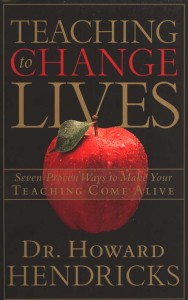The Law of Education
 Last month I began a series of posts based on The Seven Laws of the Teacher by Howard Hendricks.
Last month I began a series of posts based on The Seven Laws of the Teacher by Howard Hendricks.
If you are not working as a teacher, please do not stop reading! These posts are not only for vocational teachers and Sunday school teachers. We all have children in our sphere of influence, whether we are teachers, parents, extended family, or neighbors and friends. So I hope you’ll follow these posts as a way to bless the children in your life. And of course, these principles apply to adult learners, too!
The first post last month explained the Law of the Teacher, which states,
“If you stop growing today, you stop teaching tomorrow.”
The second law is the Law of Education:
“The way people learn determines how you teach.”
Children—and adults—learn best when they are invested in the excitement of discovery and doing for themselves. How many times have you tried to show a child how to do a new activity only to have them impatiently jump in with the words, ”I wanna do it myself!”
Three goals
Hendricks asks us to consider three goals in our teaching:
Goal #1: Teach people how to think.
The earlier we can teach children how to think, the better. Good teaching is not spoon-feeding. Ask questions. Don’t worry if your learners get the answer wrong. And be alert to teachable moments. Teaching doesn’t only happen in classroom settings.
Goal #2: Teach people how to learn.
Hendricks observed that learning is a process that first looks at the big picture, then examines the individual parts, and finally returns to the big picture. Don’t you just love it when all the pieces fall into place and the proverbial light bulb lights up?
Goal #3: Teach people how to work.
Good teachers don’t do for the student what the student can do for himself. Hendricks used the illustration of people who illegally feed the bears at Yellowstone Park. The bears lose their ability to forage for food in the fall when the tourists leave. The rangers are then left with the job of carrying away the bodies of dead bears. What’s especially sad is that the people doing the feeding think they’re helping! Is that what we do as teachers?
One more thing to consider…
The process of developing skills for how to think, learn, and work will inevitably include failures. And that’s okay. We learn by doing. What child learned how to walk without first falling down again and again?
Who is your favorite teacher? Why?

Yes, yes! Teachable moments can happen anywhere and anytime. I have wonderful memories of my elementary school teachers. I am 58 years old and still have fond memories of how they taught each subject. Life lessons can be learned through every experience. I am thankful God gives us opportunities to learn.
Yes, Melissa! I also have precious memories of elementary school teachers who poured into my life!
These principles are great. Thanks.
Ava,
I bought the book and it is a great resource. Thank you for sharing!
So glad, Lee Ann!
Pingback:The Law of Encouragement | Christian Children's Authors